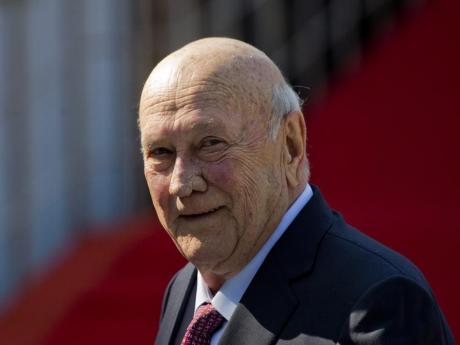South Africa’s last apartheid president F.W. de Klerk dies
JOHANNESBURG (AP) — F.W. de Klerk, who shared the Nobel Peace Prize with Nelson Mandela and as South Africa's last apartheid president oversaw the end of the country's white minority rule, has died at the age of 85.
De Klerk died after a battle against cancer at his home in the Fresnaye area of Cape Town, a spokesman for the F.W. de Klerk Foundation confirmed Thursday.
De Klerk was a controversial figure in South Africa where many blamed him for violence against Black South Africans and anti-apartheid activists during his time in power, while some white South Africans saw his efforts to end apartheid as a betrayal.
“De Klerk's legacy is a big one. It is also an uneven one, something South Africans are called to reckon with in this moment,” the Mandela Foundation said of his death.
Retired Anglican Archbishop Desmond Tutu, another towering anti-apartheid activist, issued a similarly guarded statement about de Klerk's death.
De Klerk “played an important role in South Africa's history ... he recognised the moment for change and demonstrated the will to act on it,” said Tutu's foundation.
However, De Klerk tried to avoid responsibility for the enormity of the abuses of apartheid, including in his testimony at the Truth and Reconciliation Commission, which was chaired by Tutu.
At that time, Tutu expressed disappointment that de Klerk did not fully apologise for the evils of apartheid, the statement noted.
It was de Klerk who in a speech to South Africa's parliament on Feb. 2, 1990, announced that Mandela would be released from prison after 27 years.
The announcement electrified a country that for decades had been scorned and sanctioned by much of the world for its brutal system of racial discrimination known as apartheid.
With South Africa's isolation deepening and its once-solid economy deteriorating, de Klerk, who had been elected president just five months earlier, also announced in the same speech the lifting of a ban on the African National Congress and other anti-apartheid political groups.
Amid gasps, several members of parliament left the chamber as he spoke.
Nine days later, Mandela walked free.
Four years after that, Mandela was elected the country's first Black president as Black South Africans voted for the first time.
By then, de Klerk and Mandela had been awarded the Nobel Peace Prize in 1993 for their often-tense cooperation in moving South Africa away from institutionalised racism and toward democracy.
Follow The Gleaner on Twitter and Instagram @JamaicaGleaner and on Facebook @GleanerJamaica. Send us a message on WhatsApp at 1-876-499-0169 or email us at onlinefeedback@gleanerjm.com or editors@gleanerjm.com.

